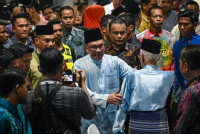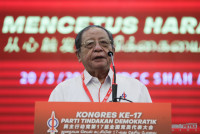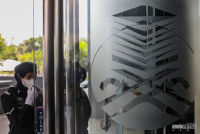MALAYSIA IS a clear supporter of the Palestinian cause and is unlikely to bend over backwards for Western powers.
The Israel-Palestine conflict has always been an issue that united the political spectrum in Malaysia, which is dominated by a Muslim-majority population. Support for the Palestinian cause is not just religious but also humanitarian and Palestinian statehood remains a unifying factor across racial, religious and political affiliations.
As much as it is critical for the Anwar Ibrahim administration to defend the rights of the Palestinians in line with the capturing of the hearts and minds of Malaysian Muslim voters, a predominant factor is also the country’s entrenched non-alignment stance.
From past leadership to the present, Malaysia has consistently made clear its pro-Palestine views, from large-scale shows of solidarity to outreach programmes. In being unequivocal in condemning Israel’s actions in Gaza and pushing for a two-state solution, Malaysia has stood for what it perceives to be a fairer global response and narrative on the Palestinian cause.
The current conflict, however, presents a new dilemma as an action in either direction presents its own implications for Kuala Lumpur. Maintaining ties with Hamas is viewed differently by Washington and this is aggravated by the financial and investment initiatives China has undertaken in Malaysia.
The United States is slighted by the reluctance of Kuala Lumpur to condemn and review ties with Hamas. Anwar has foreseen these implications and recently revealed the pressure and threats he has received from the West.
The dilemma for Washington and its allies is how best to manage Malaysia’s hardline stance on the Israel-Palestine conundrum so as not to jeopardise their long-term reliance on the country in the bigger battle for enduring Indo-Pacific power against China.
Malaysia, meanwhile, is not in a situation to side with the West unless a dramatic shift in the latter’s policy is translated on the Middle East ground.
Malaysia’s efforts to secure a tangible solution to the Israel-Palestinian conflict will not succeed without adequate bargaining power over Washington and key Arab players in the region. Its lack of diplomatic ties with Israel and a distinctly one-sided stance on the issue leaves little room for flexibility.
The West is nevertheless eyeing Malaysia’s changing leverage and influence with the Global South, Asean and the Muslim world and what this could offer to its containment of China.
Opportunity for strategic leverage
Questions remain on how deep Washington and other Western players will withstand the pressure to rein in Benjamin Netanyahu’s relentless assault on Gaza without permanently burning bridges with the Muslim world.
Malaysia’s opening here could be to craft strategic leverage over key Arab players, Asean and China in strengthening the global solidarity front with the Palestinians and piling pressure on the West.
But for this, Malaysia will need to choose between the longer-term setback of lesser Western security and economic cooperation against the short-term gains of aligning with anti-West forces and voices.
Kuala Lumpur’s ability to be a kingmaker in the Sino-US rivalry by using its leverage in emerging critical sectors including semiconductors and rare earths will be a main factor.
Any potential drawbacks in dwindling security assurances by the West as a retaliation for Malaysia’s response can be mitigated as Malaysia is already looking at enhanced defence and economic cooperation with Japan and South Korea and with existing allies Turkey, Saudi Arabia and Iran.
Malaysia may also push for new strategic solutions to the Gaza conflict at the OIC Special Summit in Riyadh next week. This could include playing the oil card among oil-producing member states.
While Malaysia’s influencing parity in pressuring Tehran to refrain from escalating the conflict with its support for Hezbollah is not the West’s expectation, it is still depended on to play a role.
Its influence in helping to prevent a widened conflict in the Middle East with the risk of a global conflagration will be intertwined with America and China’s moves in hedging their priorities in Eastern Europe, the Middle East and the Indo-Pacific. – The Vibes, November 12, 2023
Collins Chong Yew Keat is attached to the Centre for Civilisational Dialogue, Universiti Malaya, focusing on strategy and security.
Published under Creative Commons and in partnership with 360info.org


















